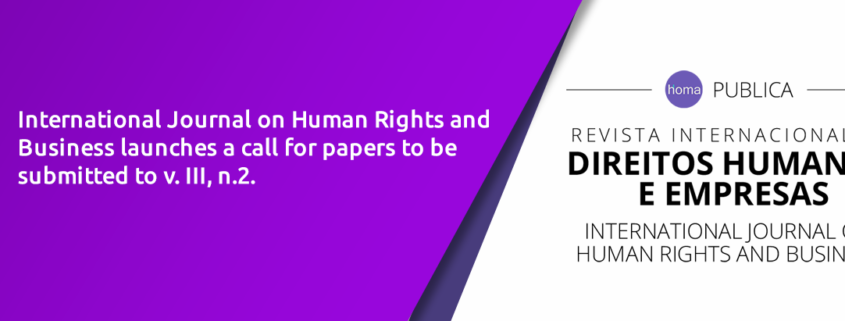International Journal on Human Rights and Business launches a call for papers to be submitted to v. III, n.2.

_________________________________________
_________________________________________
_________________________________________
_________________________________________
CALL FOR PAPERS
Homa Publica: International Journal on Human Rights and Business (http://homacdhe.com/journal/en/about/) is an electronic scientific annual and non-profit publication organized by HOMA (Human Rights and Business Centre). The Journal is registered under ISSN 2526-0774 (online), without quails yet, and currently invites researchers from several areas of knowledge to collaborate with unpublished texts for its next edition (v. III, n.2).
The goal of the Journal is to support scientific research and promote academic debate among researchers from educational institutions around the world, aiming at the publication of articles that have as a fundamental theme issues involving Human Rights and Business and Human Rights in general.
- PERIOD FOR WORK SUBMISSION
- Works will be received continuously and will be evaluated according to their date of reception.
- Authors willing to publish in the next edition (v.III, n.2) must submit the paper until 05/15/2019. The Journal is scheduled to be published in July 2019.
- PAPER SUBMISSION
- Eligible publications include works from authors of all areas of knowledge, with no limit to the number of authors in the same paper. At least a master’s degree is required for submission of individual papers. Works from undergraduate or graduate students will be accepted if co-authored with masters or doctors.
- In order to submit papers, the author(s) should send their article(s) to the following electronic address: <http://ojs.homacdhe.com/index.php?journal=homapublica&page=about&op=submissions>.
- The papers must be unpublished, exclusive and regard a relevant topic for the area covered by the Journal.
- The submission of a scientific paper does not imply mandatory publication. Homa Publica may accept or reject any work received, in accordance with the recommendations of its Editorial Board.
- The approval of the paper(s) implies immediate permission for reproduction and copyright transfer, regardless of a specific authorization document, and without charge. The author will continue to own the copyright for subsequent publications.
- The concession for publication will be free. No article processing charges (APCs) or submission fees are required.
- The author(s) authorize the Journal to make corrections or modifications to adapt the text to the publication standards as well as ABNT.
- The selection of papers for publication is the responsibility of the Editorial Board of the journal and of its appointed referees, in a double-blind peer review system. For the acceptance of the works, the following criteria will be observed: adequacy to the editorial line of the Journal and the proposed theme, compliance with the formatting standards of articles established by this Notice and ABNT standards. Suggestions of scientific nature may proposed by the reviewers, and, if accepted by the author, will lead to a new analysis.
- The concepts and information contained in the texts are the sole responsibility of their authors.
- FORMATTING RULES:
The articles, reviews and case studies submitted for publication in Homa Publica – International Journal on Human Rights and Business may be sent in Portuguese, Spanish or English. The work will be published in the submitted language and may be translated in exceptional cases.
The submitted papers have the following minimum and maximum limits for their analysis by the Editorial Board and eventual publication:
- Scientific Paper: Each work shall contain between 25,000 and 60,000 characters – Including spaces, footnotes and references;
- Case Study: Each work shall contain between 15,000 and 25,000 characters – Including spaces, footnotes and references;
- Critical Review: Each text shall contain between 7,000 and 15,000 characters – Including spaces, footnotes and references;
The presented Paper must comply with the following guidelines:
- PAPER
Page formatting: A4 paper (21cm x 29.7cm); - FONT
Arial, size 12 for text and titles;
Arial, size 10 for citation with more than 3 lines, footnotes, pagination, illustrations and tables captions; - FORMATTING
- Paragraph formatting:
Arial, size 12;
Alignment: justified;
Line spacing: 1.5 cm;
Spacing before and after paragraph: 1.5 cm; - Footnote formatting:
Line spacing: 1 cm.
Arial, size 10;
Highlights should be in italics only. - Formatting of possible direct citation (citation with more than 3 lines):
Spacing between lines: 1 cm, with left spacing of 3 cm, only. - Formatting of the Article’s title:
Arial, size 12, bold, capitalized and centered. - Subtitle formatting:
Arial, size 12, bold, left-aligned;
Each item must be numbered (including the INTRODUCTION and FINAL CONSIDERATIONS sections) with Arabic numerals and separated by only one character space.
- Paragraph formatting:
- MARGINS
Left and top margins: 3.0 cm;
Right and lower margins: 2.0 cm. - PAGES
Pages should be numbered in the header (top) right. - FIRST PAGE
The first page of the paper should contain:- Title of the article in the original language and in English, where this is not the original language.
- Full name of the authors aligned to the right below the title, separated by double spacing.
- First footnote containing: main author’s qualifications; Institution of Higher Education to which the author is bound; department of the respective institution; e-mail address and public curriculum link.
- Abstract of up to 120 words in the original language and in English (Abstract); Both should be presented in a single paragraph each, that is, without indentation. Arial font 12, and spacing 1.5 between the lines.
- Three to five Keywords, in the original language of the article and in English (Keywords), separated by period and finalized by period.
- FOOTNOTES
Footnotes should be of an explanatory nature only and should not be used for citations; except for electronic citation cases, which must be indicated in the footnotes, together with the citation page (if any) and the date of access to the material. - BIBLIOGRAPHICAL CITATIONS
These citations should be made by the AUTHOR/DATE system, containing, in the body of the text, the author’s last name in upper case/date of publication/page number (e.g. MARX, 1982, p.353);
- JURISPRUDENTIAL CITATIONS
Must contain at least the following: court, judicial body, nature and number of the case, rapporteur and date of judgment, in that order. E.g.: STJ, Xª T., REsp xxx.xxx, Rel. Min. Jxxxx Sxxxxx, j. in xx.xx.xxxx; TJRS, X.C., Ap. xxxxxxx.x, Rel. Cxxxx Dxxxxx, j. in xx.xx.xxxx (or, alternatively, publish to xx.xx.xxxx).
- REFERENCES
The complete references should be presented in alphabetical order and at the end of the text, with single spacing between lines, but separated from each other with double spacing, according to the following model: SURNAME, Name. Book’s title. City of Publication: Publisher, year of publication. (ex: GOMES, L. G. F. F. Novel and society in Brazil. Niterói: EdUFF, 1998.) - Files must be sent in two formats: in .DOC or .DOCX format. (editable), containing the author’s identification; and in .PDF, without the author’s identification.
- Articles presented in any language must comply with the same guidelines required by this notice.
Editorial Staff




Leave a Reply
Want to join the discussion?Feel free to contribute!